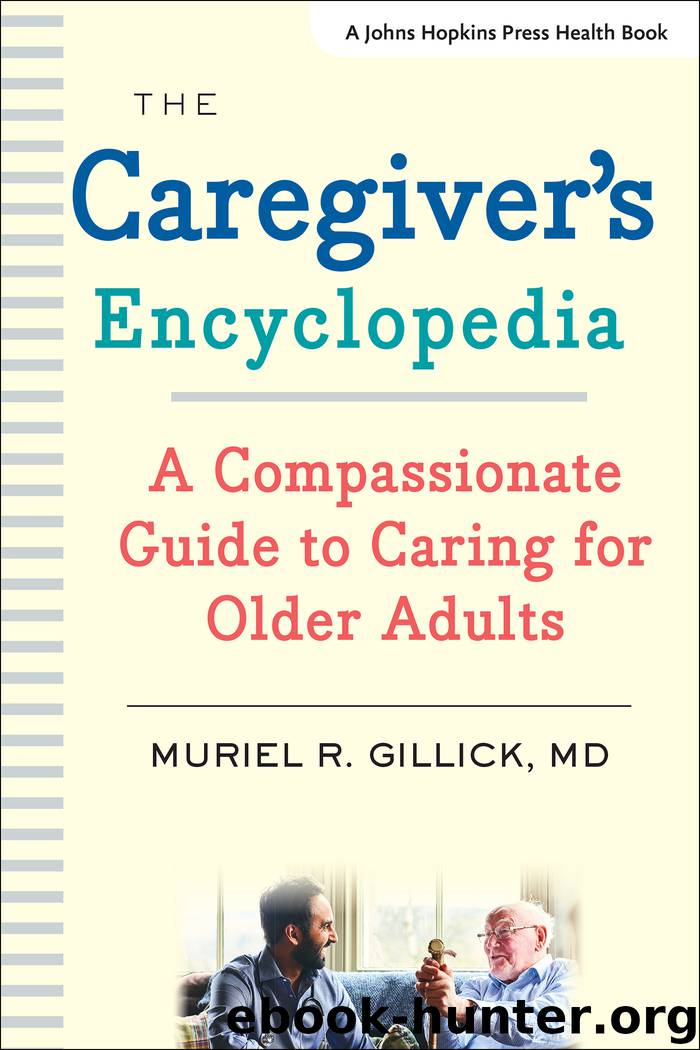The Caregiver's Encyclopedia by Muriel R. Gillick

Author:Muriel R. Gillick
Language: eng
Format: epub
Publisher: Johns Hopkins University Press
Published: 2020-02-14T16:00:00+00:00
Figure 25.2. Pacemaker
Implanting a pacemaker is a way of compensating for an excessively slow heart rate that doesn’t resolve after all potentially adverse medications are discontinued. A pacemaker is a small, battery-operated device that is placed under the skin of the chest, with wires (also called leads, or electrodes) that are threaded from the device into one of the large veins of the chest and from there into the heart (figure 25.2). Modern pacemakers weigh only a couple of ounces and are the size of two half dollars stacked on top of each other. The operation to insert a pacemaker is typically done under local anesthesia and your family member will be out of the hospital, barring complications, which are rare, in a day. The battery is usually made of lithium and typically lasts ten years. What I want to tell you about pacemakers is that while you may be skeptical about putting your relative through surgery, as procedures go, pacemaker implantation is relatively innocuous. Whether your family member’s major goal is life prolongation, maintaining his independence, or maximizing comfort, a pacemaker may be very beneficial: it can sometimes prevent falling, fainting, and confusion.
An implantable cardioverter defibrillator (ICD), which is used to treat rapid, potentially life-threatening heart rhythms (ventricular tachycardia or ventricular fibrillation), is in a different category from a conventional pacemaker. This device is also inserted under the skin of the chest with wires threaded into the heart. Its job is to administer an electrical shock if it detects rapid firing by the ventricles. It functions much like the classic external defibrillator used in performing cardiopulmonary resuscitation, but the shock is delivered by the electrodes inside the heart rather than through paddles attached to a large machine outside the body. With increasing frequency, an ICD is recommended for people who have never had a life-threatening heart rhythm but are at risk of developing one. Your family member may be a candidate for an ICD, for example, if he had a major heart attack that left him with a heart that doesn’t pump very well. What you need to know in thinking about whether to proceed with an ICD is that the much-vaunted improved survival with such a device hasn’t panned out in people who are very old and have multiple chronic conditions. In such individuals, the device is more apt to go off by accident—giving your relative an extremely unpleasant jolt—than in response to a true problem. Moreover, every time the ICD fires, your family member is supposed to go to the hospital for evaluation. On balance, the technology may cause him more harm than good. One final note of caution: if your relative does have an ICD implanted, you should discuss with the cardiologist under what circumstances you would want it turned off. In a dying person, the device may fire repeatedly, simultaneously postponing the inevitable and creating intense suffering in the last days of life.
Download
This site does not store any files on its server. We only index and link to content provided by other sites. Please contact the content providers to delete copyright contents if any and email us, we'll remove relevant links or contents immediately.
Periodization Training for Sports by Tudor Bompa(8273)
Why We Sleep: Unlocking the Power of Sleep and Dreams by Matthew Walker(6725)
Paper Towns by Green John(5191)
The Immortal Life of Henrietta Lacks by Rebecca Skloot(4588)
The Sports Rules Book by Human Kinetics(4388)
Dynamic Alignment Through Imagery by Eric Franklin(4217)
ACSM's Complete Guide to Fitness & Health by ACSM(4060)
Kaplan MCAT Organic Chemistry Review: Created for MCAT 2015 (Kaplan Test Prep) by Kaplan(4013)
Livewired by David Eagleman(3775)
Introduction to Kinesiology by Shirl J. Hoffman(3773)
The Death of the Heart by Elizabeth Bowen(3622)
The River of Consciousness by Oliver Sacks(3604)
Alchemy and Alchemists by C. J. S. Thompson(3522)
Bad Pharma by Ben Goldacre(3428)
Descartes' Error by Antonio Damasio(3279)
The Emperor of All Maladies: A Biography of Cancer by Siddhartha Mukherjee(3163)
The Gene: An Intimate History by Siddhartha Mukherjee(3098)
The Fate of Rome: Climate, Disease, and the End of an Empire (The Princeton History of the Ancient World) by Kyle Harper(3067)
Kaplan MCAT Behavioral Sciences Review: Created for MCAT 2015 (Kaplan Test Prep) by Kaplan(2986)
